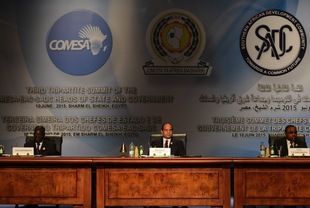Sadc takes over Tripartite economic group leadership
Chronicle | 23 April 2020
Sadc takes over Tripartite economic group leadership
by Prosper Ndlovu, Business Editor

THE Common Market for Eastern and Southern Africa (Comesa) has handed over the stewardship of the Tripartite Group of regional economic communities (RECs) to the Southern Africa Development Community (Sadc) with effect from 22 April 2020.
The tripartite bloc brings together three RECs, including the East African Community into a cooperative framework on the implementation of the Tripartite Free Trade Area Agreement (TFTA) that was launched in 2015.
Comesa head of corporate communications, Mr Mwangi Gakunga, confirmed the changeover in a statement yesterday following a tele-conference on Tuesday this week, during the 31st Meeting of the Tripartite Task Force (TTF) made up of the chief executives of the three RECs. Comesa has chaired the TTF since November 2017.
Outgoing chair and secretary general Ms Chileshe Kapwepwe (Comesa), the EAC secretary general Mr Libérat Mfumukeko and deputy executive secretary of Sadc in charge of regional integration, Dr Thembinkosi Mhlongo, attended.
Comesa leads in the first pillar, while EAC and Sadc takes the lead in the other two respectively.
Under market integration, 22 countries out of 28 have now signed the TFTA Agreement, while eight have signed and ratified.
The eight include Egypt, Kenya, South Africa, Rwanda, Uganda, Burundi, Botswana and Namibia. Only four remain to reach the 14 states threshold to operationalize the agreement. Comoros, Eswatini, Malawi, Sudan, Zambia and Zimbabwe are at advanced stages of ratification.
In her remarks Ms Kapwepwe outlined key accomplishments that the tripartite group has achieved in its three pillars; market integration, infrastructure development and industrial development.
“As I hand over to Sadc, the ratification of TFTA Agreement especially with Zambia, Zimbabwe, Comoros, Tanzania, Sudan, Eswatini and Malawi, is one of the activities that will need active follow-up,” said Ms Kapwepwe.
With regards to addressing non-tariff barriers (NTBs), she said 25 member/partner states have established focal points and national monitoring committees who are currently utilizing the tripartite online monitoring, reporting and elimination mechanism.
“Over this period, the tripartite NTBs short messaging (SMS) reporting tool was developed and rolled out. The tool is presently installed in four member/partner states namely: Comoros, Malawi, Zambia and Zimbabwe. Roll out to the rest of the member states will be necessary as will be sensitisation and monitoring to promote use of the tool by all stakeholders,” said Ms Kapwepwe in her report.
Other accomplishments listed include the adoption by tripartite sectoral ministerial committee of the agreement on movement of businesspeople and is presently awaiting signing and ratification by member states. Further, sanitary and phytosanitary and technical barriers to trade (SPS/TBT) risk profiling and risk assessment were completed for 10 member/partner states.
Additionally, tools to assess SPS/TBT costs and the cost measures documented for selected commodities and trade routes were developed.
Mr Gakunga said the EAC and Southern African Customs Unions (SACU) finalized their bilateral tariff offer negotiations on products that are subject to immediate liberalization.
EAC and Egypt have also concluded their negotiations, while those between SACU and Egypt, are also nearing completion. Under the infrastructure pillar, Kenya, Egypt, Eswatini, Ethiopia, Rwanda and Zimbabwe signed the commitment on operationalization of the Single African Air Transport Market under the Yamoussoukro Declaration on liberalization of access to air transport markets in Africa. Further, several transport corridor development projects, including the establishment of One Stop Border posts, construction, expansion, rehabilitation and upgrading of several roads and associated works were completed.
In his remarks, Dr Mhlongo, who represented the Sadc executive secretary, Dr Stergomerna Lawrence Tax, noted that his organization was taking over the stewardship of the group at a critical time of crisis occasion by Covid-19 pandemic.
“We may have to re-look at the tripartite implementation plans and prioritize what can be done in the prevailing environment that we are all in,” he said. Dr Mhlongo noted that the implementation of activities under the industrialization pillar has been slowed down by resource constraints.
EAC secretary general Mr Mfumukeko appreciated the achievements under Comesa leadership and expressed confidence of further progress under Sadc.





